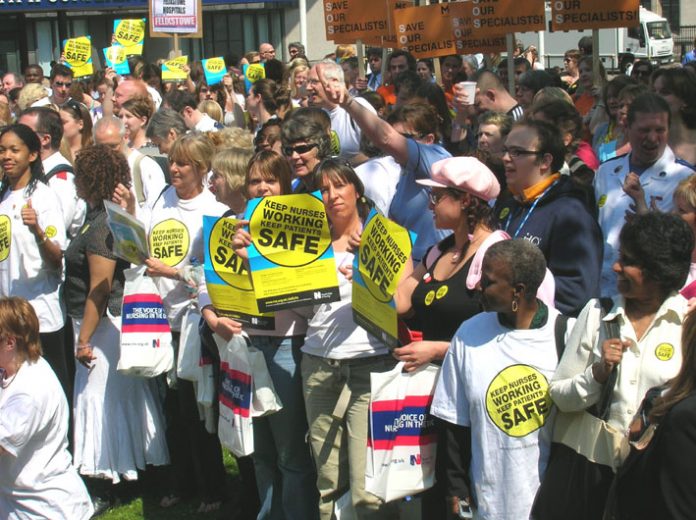Patients staying in hospitals where there are fewer nurses on the wards are more likely to die or experience complications, according to a major new study launched by the Royal College of Nursing (RCN) yesterday.
The independent study establishes a direct link between the number of nurses working on wards and patients’ chances of recovery and survival.
Professor Anne Marie Rafferty of King’s College, London, surveyed nearly 4,000 nurses and looked at 118,752 patient episodes of care in 30 hospital trusts in England.
She found that wards with lower nurse to patient ratios had a 26 per cent higher patient mortality rate, concluding that had there been more nurses on the wards, 246 lives could have been saved.
RCN General Secretary Dr Beverly Malone said the research showed ‘why we must not allow nursing posts to be sacrificed to ease financial deficits.
‘This is short-termism in the extreme and will end up costing the health service more in the long run as patients with complications that should have been picked up in the first place are re-admitted.
‘It is vital we ensure we have the right numbers of nurses and skills mix on hospital wards if we are to give patients the best chance of recovery.’
On the eve of the survey’s publication, the government circulated NHS trusts with a document demanding more ‘productivity’ which is a recipe for even more cuts and sackings.
Launching Better Care, Better value indicators, Health Minister Andy Burnham claimed that ‘improved NHS productivity and better efficiency could unlock resources worth £2.2bn for the NHS and improve patient care at the same time’.
According to the DoH, the indicators ‘highlight how reducing the amount of time patients stay in hospital, minimising the level of emergency admissions to hospital and better management of staff sickness and turnover could improve patient care and value for money’.
The ‘productivity indicators’ suggest rapid patient discharges; refusing a number of minor procedures, such as tonsillectomies and hysterectomies; cutting the number of A&E admissions, treating asthma and angina sufferers ‘in the community’ and stepping up the use of day surgery.
The DoH says that NHS Trusts will be informed ‘on a quarterly basis’ how they ‘compare to similar organisations to help them identify best practice and identify areas of underperformance’.
It gives a breakdown of the ‘productivity opportunity for the clinical indicators’:
‘Bed days saved by reducing variation in length of stay, £975m; reduced emergency admissions, £348m; reduced variation in outpatient referrals, £278m; management of surgical thresholds, £73m; increased rates of day case procedures, £16m; reduction in pre-operative bed days, £510m: Total £2.2bn.’
Dr Jonathan Fielden, chairman of the BMA’s consultants committee said consultants will be studying the documents ‘to see how they will impact on workload and delivering best patient care.’
A BMA spokesperson added: ‘Reducing length of stay in hospital MAY save the acute trust a certain amount of money but will not necessarily generate the total savings indicated, given that there may well be increased costs in the community or higher rates of re-admission if patients are discharged too early.
‘Likewise, an area with a high incidence of emergency admissions may reflect poor quality unscheduled care policies (including out-of-hours services) which would need significant investment to make a difference.’
The BMA spokesperson added that ‘the conclusions are over-simplistic and the savings may be over-estimates’.
A spokesperson for UNISON said: ‘There needs to be a very clear distinction between sharing good practice and pure cost cutting.
‘It is down to doctors to say whether an operation is necessary, not the government. You cannot set down hard and fast rules about when a patient should come into hospital or how long they stay, when each case is different.’
GMB trade union national officer, Sharon Holder told News Line: ‘Anything that saves the NHS money but does not reduce services should be addressed.
‘But if service is dropping to patients they will start to revolt and rightly so.
‘We are stepping up our campaign for the NHS in the new year.
‘I think industrial action will happen. There will be a major hospital closure in London and that will be a turning point.’
